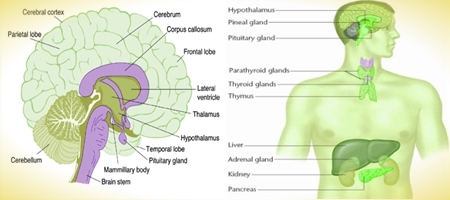Difference between Nervous Coordination and Chemical Coordination

Difference between Nervous Coordination and Chemical Coordination
Nature has designed human body in a different way. It consists of organs which are under control of brain and peripheral systems. This regulation of internal system of body is termed as ‘homeostasis’. Its examples include maintenance of a constant level of water in body and a constant temperature of body. In humans, Nervous and chemical coordination are two basic components of regulation of organs. Both these systems function simultaneously to control various functions of body like movement, thinking and emotions. Both of these systems sense changes in the external environment and adjust internal environment accordingly to avoid harm to the body organs.
Nervous Coordination
Human nervous system has got two divisions, central and peripheral nervous systems. Central nervous system comprises of brain and spinal cord. Brain is divided into three parts and it receives signals from spinal cord, gets those signals interpreted and then sends signals for action according to the input signals back to the body through spinal cord e.g. if we touch a hot object, signals travel through spinal cord to brain and brain orders the touching part to withdraw immediately but all this process occurs in milliseconds.
Chemical Coordination
Chemical coordination is under the control of endocrine system of body which consists of different glands at various locations of body. There are a total of 20 glands in the body. These glands secrete different chemicals called hormones which have got several functions depending upon their origin. E.g. thyroid gland in neck and which is responsible for regulation of metabolism and adrenal gland in the lumbar region which regulate heart rate. Every hormone has different site and duration of action.
Nervous VS Chemical Coordination
Working unit:
Nervous system consists of neurons which are its fundamental units.
Chemical system consists of cells which produce hormones.
Site of action:
Chemicals produced by neurons act very close to their site of production.
Hormones can act far away from their site of production.
Examples
Acetylcholine is produced at the ends of nerves and act at the same site.
Thyroid glands produce thyroxin, T3 and T4 which act at peripheral tissues.
Number of Target cells:
Chemicals produced by neurons act at limited number of cells.
Hormones act at large number of cells that may be up to millions.
Onset of response:
Nervous system has immediate effect to response.
Hormones may have immediate effects like insulin or delayed effects like growth hormones.
Stimulation:
Nervous system is under control of electrical system.
Hormonal system is under control of chemical stimulation.
Impulse conduction:
Nervous system is under very fast. Speed of impulse is 100 meters per second.
Hormonal system is not very rapid.
Life span of chemicals:
Chemicals of nervous system have very short life span.
Hormones remain active for a longer period of time in blood.
Conclusion
Human body has got different organs whose functions are coordinated through nervous and endocrine system. Both have different chemicals, produced through different cells, act at different target areas and produce different results.


Great! Really helpful.
Thank you .
That’s really outstanding
W/o! It’s good . And aslo tank I
thanks
Wow really amazing…..outstanding. Thank u so much
very well welcomed
Really helpful for students…..an epitome of a marks-attaining answer.
You are very welcome.
It just abled me to clear my concepts. Thank you.
Thinking
i m not under stand about this ..why chemical co ordinatio is slower in reponse??….😭😭😭
ok please provide the details then if you think there is something missing or information.
Thanks really helpful for students.
That’s really outstanding
thanks for appreciation. Keep visiting.
Thank you so much its really help full.